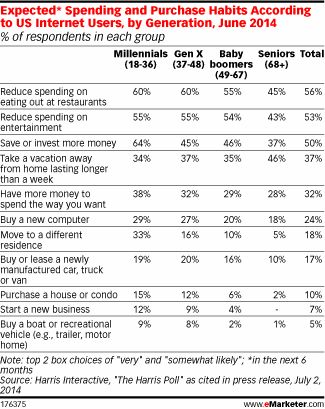Millennial spending can be hard to gauge at times, mainly because of its unpredictability. Case in point — households with millennials tend to spend less money on average than general ones in the United States, but still have large expenditures. According to a report from eMarketer, this is likely to lead to annual spending around $1.4 trillion within just a matter of years, by the time 2020 rolls around.
This report, titled “Adult Millennials as Consumers: Sifting Through the Contradictions in Their Shopping Behavior,” goes over expected spending and purchase habits across a variety of U.S. Internet users, and is broken down by generation. As expected, millennials play a big part in that, as 60 percent plan to reduce spending on eating out at restaurants if that means getting closer to ideal purchases. Gen X members are in the same percentile, while baby boomers and seniors are at 55 and 45 percent, respectively. Spending less on entertainment also plays a big part.

However, the report also shows that millennials are likely to invest more money in certain purchases, as well as take prolonged vacations. The percentage gets smaller when it comes to buying new “stuff,” such as a computer, a house or condo, or even a new business, going down to around 29 percent, 15 percent and 12 percent, respectively.
Millennials also seem keen on spending more on general experiences rather than general “stuff,” according to a 2014 report from The Intelligence Group. This audience would be “the first generations of NOwners, or those who prize access over ownership.”
Another poll by Zipcar, conducted late last year, pointed out that 61 percent of 18 to 34 year olds polled prefer “experiences” over “possessions,” and an older proportion of the audience said close to the same thing.
More details on this report can be found here. But it seems millennials are living more “for the now” than investing in too many items for the future.

